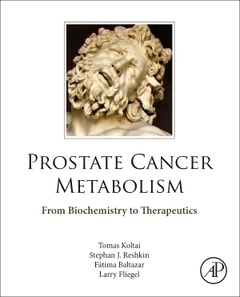Prostate Cancer Metabolism From Biochemistry to Therapeutics
Auteurs : Koltai Tomas, Reshkin Stephan J., Baltazar Fatima, Fliegel Larry

Prostate Cancer Metabolism: From Biochemistry to Therapeutics shows the peculiarities of prostate cancer metabolism, emphasizing the targetable aspects ? that have not been considered in conventional treatment protocols. The book specifically addresses treatment of the castration-resistant stage of prostate cancer proposing many repurposed drugs and nutraceuticals to complement, not replace, standard therapies. The large body of evidence supporting these concepts makes them deserving of further research and well-designed clinical trials. It discusses lipid, cholesterol, glutamine, and glucose metabolisms and their impact on prostate cancer. Additionally, it explains how current established drugs can be repurposed to improve treatment outcomes.
The concepts set out in the book, that deal with cancer at the cellular/molecular level, help identify new avenues of research and treatments to pursue that do not affect well-being whilst offer consistent benefits. Since most practicing physicians have not studied basic biochemistry since medical school, each chapter begins with a brief review of the topic to facilitate an understanding of the metabolically-oriented approach to targeting prostate cancer. Conventional treatments are not discussed here since they are covered in textbooks and specialized updates that abound in the medical literature.
It is a valuable resource for cancer researchers, oncologists, clinicians and members of biomedical field who want to learn more about prostate cancer metabolism and how to apply recent findings in the field to bedside.
1. Introductory words: cell metabolism and systems biology2. Introduction to prostate cancer metabolism and treatment with nonconventional drugs3A. The conductors of the metabolic orchestra: part I3B. Phosphatase and tensin homolog deleted in chromosome 10: another metabolic regulator in prostate cancer?4. Lipid metabolism part I: an overview5. Lipid metabolism part II: sphingolipids and ceramides6. Fatty acid synthesis and prostate cancer7. Cholesterol metabolism in prostate cancer8. Glutamine metabolism in prostate cancer9. Carbohydrate metabolism in prostate cancer10. pH and electrolytes metabolism in prostate cancer11. Iron metabolism in prostate cancer12. Androgen metabolism in castration-resistant prostate cancer13. Summary, discussion, and conclusions
Stephan Reshkin, PhD, is molecular biologist and Associate Professor at the University of Bari (Italy). Dr. Reshkin has published 108 scientific papers, several book chapters and co-authored An Innovative Approach to Understanding and Treating Cancer: Targeting pH (Elsevier, 2020). His main research interests are cancer cell and pancreatic ductal adenocarcinoma.
Fátima Baltazar holds a degree in Pharmaceutical Sciences by the University of Coimbra (Portugal, 1991), a PhD by the University of Hull (UK, 1998) and has postdoctoral experience at the University of Minho (Portugal, 1998-2003). She is currently Associate Professor at the Medical School of University of Minho (Portugal). Fatima joined ICVS (Life and Health Sciences Research Institute) team in 2004 and she is currently Principal Investigator and Coordinator of the Surgical Sciences Research Domain (SSRD). She started her research on the Cancer field in 2005 and, in the last years, Fatima’s main research interest has been on cancer metabolism, focusing on the discovery of new prognostic metabolic biomarkers and cancer therapeutic targets, using human samples and suitable in vitro and in vivo
- Explains the basic aspects of prostate cancer metabolism, including its biochemistry which has a pivotal role in clinical practice
- Discusses new drugs and nutraceuticals with a metabolism-centered approach
- Offers practical bedside approach in combination with molecular and biochemical fundamentals to help readers identify and provide the best treatment to their patients
Date de parution : 06-2021
Ouvrage de 416 p.
19x23.4 cm
Thème de Prostate Cancer Metabolism :
Mots-clés :
Abiraterone; Acetyl-CoA carboxylase (ACC)ATP citrate lyase (ACL)Fatty acid; Aerobic glycolysis; Amiloride; AMPK activation; AMPK; Androgen; Anti-Warburg effect; Arachidonic acid; ASCT2 transporter; Autophagy; Bazedoxifene; CAMKK; Cancer metabolism; Carbonic anhydrase; Cariporide; Celecoxib; Ceramides; Cholesterol; Choline kinase; Complementary prostate cancer treatment; Corticosteroids; Cyclooxygenase; Dichloroacetate; Dipyridamol; Ellagic acid; Enzalutamide; Ethacrynic acid; Everolimus; Exosomes; Extracellular acidosis; Fatostatin; Fatty acid synthase (FAS)Orlistat; Fatty acid synthase; Fenretinide; Glutaminase; Glutamine addiction; Glutamine; Glutaminolysis; Haploinsufficiency; Hormonal treatment resistance in prostate cancer; Inositol triphosphate kinase; Intracellular alkalosis; Inversion of the pH gradient; Ketoconazole; Krebs cycle; Lactate shuttle; Lactate; LAT1 transporter; Lipogenic phenotype; Lipooxygenase; LKB1mTORC1Peutz-Jeghers syndrome; Melatonin; Metabolic switch in prostate cancer; Microenvironment; Monoacylglycerol lipase; Monocarboxylate transporters; Nelfinavir; NHE1Niemann-Pick C1 protein; Opaganib; PI3K inhibitors; Prostablock list; Prostate cancer; PTEN; Pyruvate; Rapalogs; Rapamycin; Removing iron or inducing ferroptosis in prostate cancer cells; Riluzole; Salinomycin; Soraphen A; Specific androgen receptor degraders (SARDs)Sphingolipids; Sphingosine kinase; Statins; Sterol regulatory element-binding protein (SREBP)Sylimarin; Systems biology; Therapeutic interventions involving iron such as blocking its uptake; Warburg effect; Wnt/beta catenin pathway


